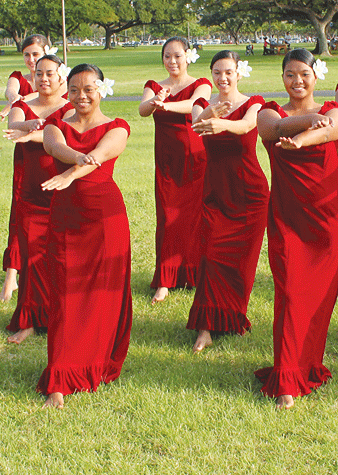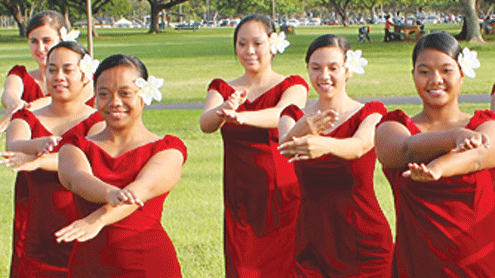
Hawaiian and Pacific Islands divisional ‘hula halau’ glorifies God through dance.
By Kevin Pontsler
“Ka lei o ka Haku” (“the lei of the Lord”), the Hawaiian and Pacific Islands divisional “hula halau” (or “hula group”) ministry, includes 13 members representing corps from Oahu, Maui and the “big island” of Hawaii.
In 2006, then-Major Dave Hudson, divisional commander at that time, initiated the halau to “share God’s love, lead others to Jesus and be a blessing through their worship in hula.” Former Divisional Music Director Crystal Nakamaejo chose the halau’s name.
“A lei is an adornment of many different flowers,” Nakamaejo said. “In Hawaiian culture, children are often referred to as the flowers or ‘pua,’ and when combined, all of these pua make a beautiful lei. In the same way that children are a product of their parents, we, as children of God, are products of his love. Our lei is comprised of halau members who dance hula as worship unto our Haku [Lord].”
Over the years, the halau has performed at divisional events including family camp, women’s ministries camp and youth councils. It has traveled to the mainland, touring in Florida with the Western Territorial Songsters in 2010. In June, the group will perform at The Gathering in Pasadena, Calif.
“For me, it’s the bond that we have,” said halau member Klasharine Rudolph. “It’s good to know that you have Christian sisters, not just when you need them, but all the time.”
The group gathers once a month at the Kauluwela Corps to practice, which for some includes flying in the night before, bunking at the home of the current leader, Dasia Rodriguera, and flying back to be at their home corps on Sunday morning.
“I love dancing hula,” said Kylie Leong, another group member. “I grew up dancing hula—who doesn’t want to do what they love?”
The hula is intended to glorify God and not man. “I think when we perform—or whenever any ministry performs—they [the audience members] feel something,” Rodriguera said. “That’s the power of the Holy Spirit; they may not know it, but they have a feeling.”











